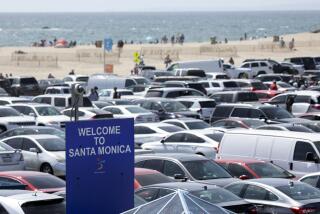California state park fees to increase at many locations next week
It will cost more to visit many California parks starting Monday.
Day-use parking fees will increase $2 to $5, depending on the park, and camping fees will rise by $10 to $21 a night, according to state parks Director Ruth Coleman.
“In these dire economic times, we can no longer afford to keep our fees at their current levels,” Coleman said. “The people of California understand that by charging more, we will be able to keep more parks open and preserved.”
A list of parks where fees will rise will be made available when the increases go into effect, Coleman said.
The increases will not be enough to keep all state parks open, so officials are still seeking financial help from businesses and other sources.
The fee hikes and potential park closures are a result of deep budget cuts recently enacted by the Legislature and governor. Those include three furlough days per month for parks workers.
-- Patrick McGreevy
--
New rules expected to cut TV energy use
We’ve heard that television rots brains, but have you ever thought about what TV-watching does to the environment?
Americans are buying newer, flatter models in droves. And in California, television use -- including DVD players, DVRs and cable boxes -- accounts for 10% of a home’s energy consumption, according to the California Energy Commission.
The commission, which is often the first in the nation to set product standards, is expected in the next few weeks to release minimum efficiency rules for televisions sold in the state. The standards are expected to decrease TV energy use by 30% to 50% and save Californians almost $1 billion in electricity bills once they are fully implemented.
Under the new rules, limits would be based on the size of the television so “consumers will always have the freedom to buy any size or style TV they like,” according to the commission. Hundreds of flat-screen models manufactured by major companies such as Vizio already meet requirements.
“These TVs use off-the-shelf technology and are produced by all the leading manufacturers, including Samsung, Sony, Panasonic, Vizio and Sharp, as well as value brands such as Sylvania and Insignia,” according to the Natural Resources Defense Council, which has thrown its support behind the measure.
But the Consumer Electronics Assn., a coalition of industry interests, has objected to the standard, which it says would lead to job losses and lower tax revenues, and “ban” certain TV models.
“No one’s banning anything,” said Energy Commission spokesman Adam Gottlieb. “We’re providing consumers with the most energy-efficient televisions available.”
-- Amy Littlefield
--
Read more about the environment in California and beyond on Greenspace, The Times’ environmental blog, at www.latimes.com/greenspace.
More to Read
Sign up for Essential California
The most important California stories and recommendations in your inbox every morning.
You may occasionally receive promotional content from the Los Angeles Times.










